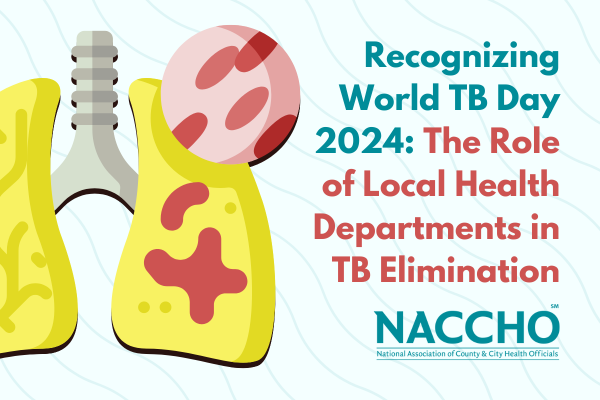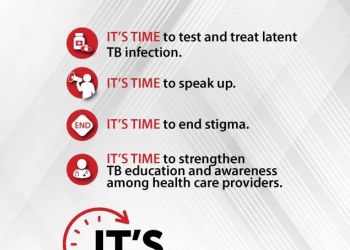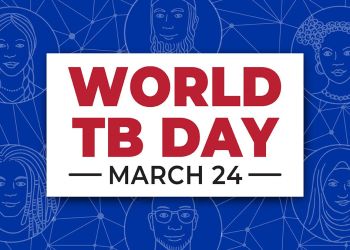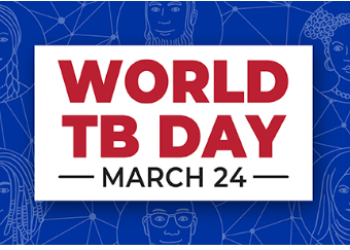Throughout the year, local health departments (LHDs) nationwide work diligently towards eliminating tuberculosis (TB) in their communities. They employ crucial strategies like surveillance, timely case detection, and effective contact tracing to substantially decrease TB incidence rates. Through providing essential services including testing, treatment, and case management, LHDs are able to improve outcomes for individuals affected by TB.
TB, caused by the bacterium Mycobacterium tuberculosis, primarily affects the lungs but can also impact other parts of the body. It spreads through the air when an infected person coughs or sneezes, making it crucial to detect and treat cases promptly to prevent further transmission.
As World TB Day approaches on March 24, 2024, the National Association of County and City Health Officials (NACCHO) recognizes and celebrates the contributions of LHDs to the global TB elimination mission. Despite the progress made, challenges persist, including funding constraints, stigma, and the emergence of drug-resistant bacterial strains. Overcoming these obstacles requires collaborative efforts between local, state, and federal agencies, as well as partnerships with community-based organizations.
Each year, the Centers for Disease Control and Prevention (CDC) honors U.S. TB Elimination Champions, spotlighting individuals who have made significant contributions to TB elimination. Among them is Xuan Man, acknowledged in 2023 for her exceptional work at the Tacoma-Pierce County Health Department.
In a conversation facilitated by Dr. Masa Narita, NACCHO’s liaison representative for the Advisory Council for the Elimination of Tuberculosis (ACET), Xuan Man shared insights into her efforts in TB elimination, particularly focusing on her work with refugee and immigrant populations. Dr. Narita and Xuan’s dedication and contributions underscore the collaborative spirit driving progress in the ongoing fight against TB.
Dr. Masa Narita’s interview with Xuan Man, 2023 U.S. TB Elimination Champion:
Please tell us about your work and how your work helps people in your community to address TB.
My work with the Refugee and Immigrant Health Program aligns with our department’s vision, mission, and values, which focus on prioritizing communities with needs for improvement of health through equity, integrity, respect, and leadership.
The program is very well-integrated within the Communicable Disease Control Division, Epidemiology and Tuberculosis programs.
We work to prevent and control the spread of infectious diseases in all communities. We collaborate and partner with Washington’s Refugee and Immigrant Health Program, the Office of Refugee and Immigrant Assistance, and community healthcare providers to provide medical health screening examination to our new arrivers. We follow the CDC Guidance for the U.S. Domestic Medical Examination for Newly Arriving Refugees and Washington state’s Domestic Medical Screening Guidelines to screen our new refugees.
Some refugees and immigrants arrive in the U.S. with a Classification of TB (Class B TB) that is notified to the local health department through the CDC/EDN for Refugee/Immigrant and Class B Arriver System. Upon receiving the notification, we screen and evaluate the arrivers for TB disease and TB infection. If they’re diagnosed with latent TB infection (LTBI), we refer them to community health care clinics for follow-up and treatment.
Please tell us about the unique opportunities you have to address TB because you work at a local health department (i.e. not at the state or federal level).
Working with the health department for 30 years has helped me understand how much public health has touched the lives of so many people from different backgrounds and countries of origin in terms of TB treatment, infectious diseases, vaccine preventable diseases, food safety, etc.
Because we are a local public health department, we can work closely with communities and clinics that are greatly impacted by TB disease. We can educate the community about TB, promote preventive behaviors, and address TB and latent TB infection more effectively with funding and resources from federal and state entities.
How do you leverage the resources and network outside your unit to maximize your contribution and impact?
- We leverage resources from CDC’s and DOH’s TB webpages, including those for refugee health, to guide our response to TB disease and infection prevention efforts.
- We attend WA State TB Project ECHO (Extension for Community Healthcare Outcomes) weekly, when possible, to learn about TB and LTBI cases from other local health jurisdictions (LHJs) and states.
- We attend TB and LTBI training through the Curry International TB Center (CITC) for updates and resources related to disease prevention and response.
- We provide patients with information including locations for community health care clinic partners where they can receive TB screening services and LTBI treatment.
- We have a great network of clinic providers and resources on our website for TB screening, consultation, and treatment for adults and children.
Please tell us about some rewarding experiences you’ve had working with refugees and immigrants at your local health department.
It’s a privilege to serve our refugee and immigrant communities, especially given my own refugee journey to the U.S. in 1991. In my role at the health department’s Refugee and Immigrant Health Program for 30 years, we embody “public health” faces.
Our success stems from strong partnerships with federal, state, and local health departments, clinic providers, and communities. I’m grateful for our dedicated team of TB and epidemiology nurses and disease investigation specialists who work tirelessly to ensure community health and safety.
When I was awarded the 2023 CDC U.S. TB Elimination Champion last year, I was so surprised and elated. I even received congratulation emails from those I work with at other health departments. One wrote: “You lead with your heart and that is why you connect so well with the people you serve and work with. But you also are a problem solver, so when things are not right, you look for solutions and never give up! Thank you for your guidance and I continue to look to you for inspiration!”
This acknowledgment reaffirms our commitment to the cause and motivates us to persist in our mission of TB elimination.
Please also share about some rewarding experiences addressing TB in the local population you work with.
Some rewarding experiences to address TB in the local population I work with are:
- Being bilingual and knowing my community well helps me promote TB education more broadly. Also, I’ve enjoyed collaborating with others who speak different languages to promote TB education in other communities.
- Being able to help our TB nurses with translating and interpreting for many TB patients over the past 30 years, and to witness those who at first were very sick with TB and got well after receiving treatment has always been rewarding and a privilege.
- Seeing any new arrivers with Class B TB condition complying and completing their TB screening and evaluation process while waiting to rule out TB disease is also rewarding. If new arrivers are recommended and referred for latent TB infection treatment, most of our patients go through and complete the treatment with our community health care providers. It is rewarding to be able to continue our public health education and treatment and prevent and control TB disease!
What would be your goal or your initiative to address TB this year?
Foreign-born persons enter the United States by various immigration categories. It is important that we understand the arrival definitions of these categories. How a person is categorized can help explain if they received a health screening for diseases of public health significance, including TB, from their countries of origin. Currently, visitor and international student categories do not have to go through a medical examination including TB screening from their countries of origin before entering the U.S.
We hope CDC and the United State Citizenship and Immigration Services (USCIS) will review, consider, and make decisions on these categories. Individuals should receive examinations from their countries before entering to the U.S. These institutions can stablish policies that help prevent infectious diseases from foreign-born persons before entering the U.S.
We have had and treated a few TB cases in these categories. Given the current politics, it can be a burden to treat them due to the spread of TB disease, compliance, and funding constraint.
We will continue to educate the public about the impact of TB in our community, especially to those communities that have high prevalence of TB disease from their countries of origin.
We will continue to collaborate and partner with healthcare providers to commemorate the 2024 CDC World TB Day’s theme, “Yes! We Can End TB,” in our work with TB.
We hope to receive more funding to work with community clinic providers to provide TB screening and LTBI treatment services to help us move forward with our goal of eliminating TB disease in our community.
--
On World TB Day 2024, let’s acknowledge and support the indispensable contributions of local health departments. Together, with dedicated individuals like Xuan, we can work towards a future free from TB, both domestically and globally.
For information about the role of local health departments in TB control in the United States, you can refer to official websites of organizations such as:
Centers for Disease Control and Prevention (CDC) - The CDC provides comprehensive information on TB control efforts in the United States, including data on TB incidence rates, surveillance, and the role of local health departments. You can explore their TB website: https://www.cdc.gov/tb/default.htm
- CDC shared TB survivor videos on their social media channels including this video shared on X
National Tuberculosis Controllers Association (NTCA) - The NTCA is an organization that represents state and local TB control programs in the United States. Their website may provide insights into the activities and contributions of local health departments in TB elimination: https://www.tbcontrollers.org/



